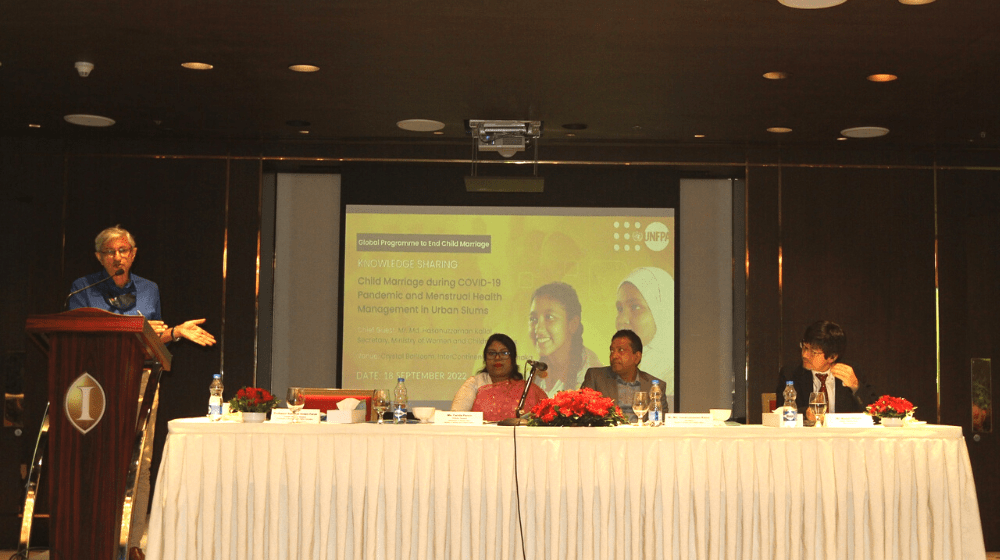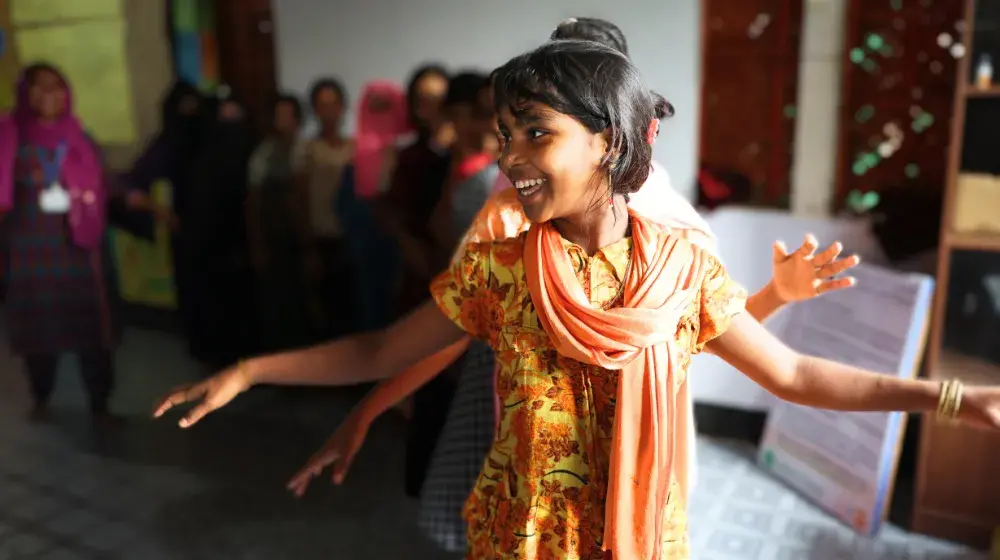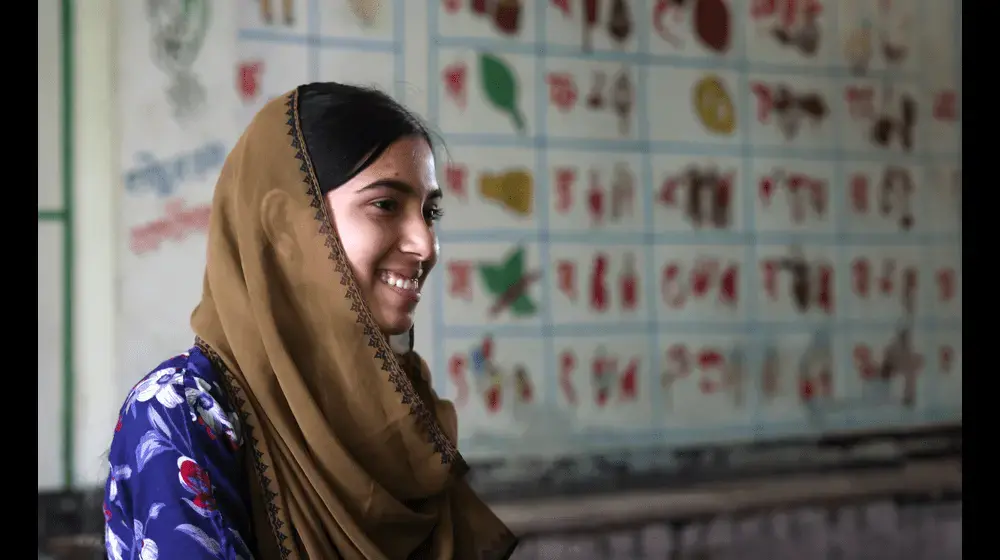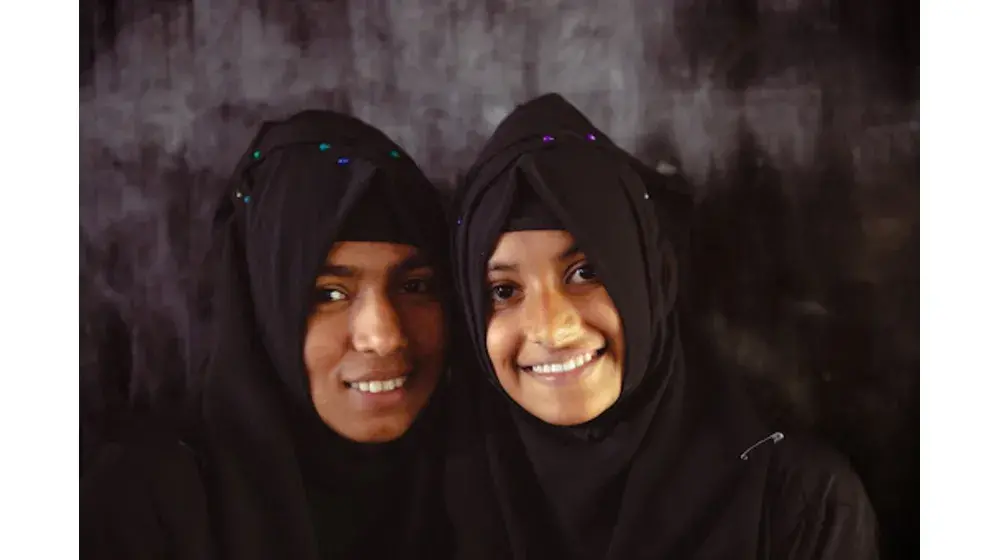[Dhaka, 18 September 2022]: Knowledge Sharing Event on child marriage in the context of the Covid-19 pandemic and menstrual health management in urban slums, was hosted by UNFPA on Sunday, 18 September 2022. The purpose of the event was to discuss the findings of the two studies - one to shed light on the situation of child marriage during COVID-19 and the other on menstrual hygiene management of women and adolescent girls in urban slums- that were recently conducted with a view to understand experiences of girls and women and encourage greater investment in research and programming.
Md Hasanuzzaman Kallol, Secretary of the Ministry of Women and Children Affairs was present as a chief guest, Ms. Farida Pervin, Director General of the Department of Women Affairs was a special guest. Amongst others Prof. Dr. Syed Md. Golam Faruk, former Director General of the Directorate of Secondary and Higher Education a key discussant, Mr. Masaki Watabe, Deputy Representative of UNFPA Bangladesh also spoke to the event on behalf of UNFPA. Officials from the Ministry of Women and Children Affairs (MOWCA), Department of Women Affairs (DWA), Directorate of Secondary and Higher Education (DSHE), National Curriculum and Textbook Board (NCTB) and representatives from INGOs, Development Partners, UN agencies and National NGOs, academicians and members from civil societies, students were also present at the event.
Md Hasanuzzaman Kallol, Secretary, of the Ministry of Women and Children Affairs, who was the Chief Guest at the event said that joint efforts of multiple stakeholders were required for ending child marriage in Bangladesh. Good governance has a direct relation to accelerating action to end child marriage. He also mentioned that fathers and brothers should be encouraged to support girls in all aspects of their life, including during their menstruation. He personally did it for his daughter while she had her first menstruation. On the other hand, toilet facilities should available at every educational institution and workplace so that women and girls can feel comfortable when they study and work.
Ms. Farida Pervin, Director General, of the Directorate of Women Affairs said, the government has taken a multisectoral programme for the prevention of child marriage at every union and appealed to UN agencies, Donors, NGOs and civil societies to raise awareness and ensure the policies are implemented at sub-national levels.
Professor Syed Md Gulam Faruk, former Director General of the Directorate of Secondary and Higher Education, highlighted the major gap between people’s perception and the reality of child marriage, especially in the last two years that the world faced with the COVID-19 pandemic.
Mr. Masaki Watabe, UNFPA Deputy Representative, Bangladesh said that these studies brought out the voices of the women and girls and encouraged all the partners to implement evidence-based, nuanced, contextualized and targeted interventions keeping women and girls at the centre. He also mentioned that more robust and real-time data is required to understand these important social phenomena in depth.
In the event, researchers presented the findings on ‘Child Marriage during COVID-19 pandemic in Bangladesh: A Rapid Study’ and ‘Menstrual Health Management among Women and Adolescent Girls in Urban Slums in Bangladesh’ followed by a plenary discussion on these studies. The study on Child Marriage during COVID-19 found that the child marriage rate among the surveyed population was 25.6% which was lower than the projected estimate during the pandemic. However, it masked underlying variation at the district level that ranged from 4 to 40 per cent. Findings from MHM Study showed that access to technology and internet connectivity enabled women and adolescent girls to access information about menstruation, yet among all age groups, there was a major knowledge gap on the negative consequences that inadequate menstrual hygiene can have on their health and wellbeing. Over 40% of adolescent girls and women use a cloth to manage their menstruation in spite of their preference (66%) to use disposable pads. Disposal pads with the belt were the preferred choice of product for adolescents with over 63% of those who purchased menstrual pads where girls. Access to toilets where Women and Adolescent Girls can manage their menstruation with privacy was also reported as the major challenge.





